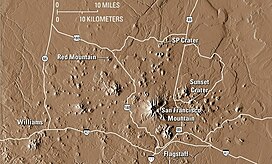| San Francisco Peaks | |
|---|---|
 The San Francisco Peaks viewed from atop nearby 9,000 ft Mount Elden | |
| Highest point | |
| Peak | Humphreys Peak |
| Elevation | 12,633 ft (3,851 m) NAVD 88[1] |
| Coordinates | 35°20′47″N 111°40′41″W / 35.346341917°N 111.677945539°W[1] |
| Naming | |
| Native name | |
| Geography | |
| Country | United States |
| State | Arizona |
| Range coordinates | 35°20′N 111°40′W / 35.333°N 111.667°W |
| Geology | |
| Rock age(s) | Between 1 Million and 93,000 Years Ago |
| Mountain type | Stratovolcano |
| Rock type | Igneous |
| Volcanic field | San Francisco volcanic field |
| Last eruption | ~400,000 years ago |
The San Francisco Peaks (Navajo: Dookʼoʼoosłííd, Spanish: Sierra de San Francisco, Hopi: Nuva'tukya'ovi, Western Apache: Dził Tso, Keres: Tsii Bina, Southern Paiute: Nuvaxatuh, Havasupai-Hualapai: Hvehasahpatch/Huassapatch/Wik'hanbaja, Yavapai: Wi:mun Kwa, Zuni: Sunha K'hbchu Yalanne, Mojave: 'Amat 'Iikwe Nyava)[2] are a volcanic mountain range in the San Francisco volcanic field in north central Arizona, just north of Flagstaff and a remnant of the former San Francisco Mountain. The highest summit in the range, Humphreys Peak, is the highest point in the state of Arizona at 12,633 feet (3,851 m) in elevation. The San Francisco Peaks are the remains of an eroded stratovolcano.[3] An aquifer within the caldera supplies much of Flagstaff's water while the mountain itself is in the Coconino National Forest, a popular recreation site. The Arizona Snowbowl ski area is on the western slopes of Humphreys Peak, and has been the subject of major controversy involving several tribes and environmental groups.[4][5]
- ^ a b "Frisco". NGS Data Sheet. National Geodetic Survey, National Oceanic and Atmospheric Administration, United States Department of Commerce. Retrieved 2021-02-05.
- ^ "History of the San Francisco Peaks and how they got their names". United States Forest Service. Retrieved 2021-10-19.
- ^ "The San Francisco Volcanic Field, Arizona". USGS factsheet. Retrieved 2006-12-16.
- ^ "San Francisco Peaks, AZ". NASA Earth Observatory. Archived from the original on 2006-09-30. Retrieved 2006-05-23.
- ^ Nasaw, Daniel (2011-10-19). "Indians oppose 'recycled' sewage for Arizona skiing". BBC News Magazine. BBC.
